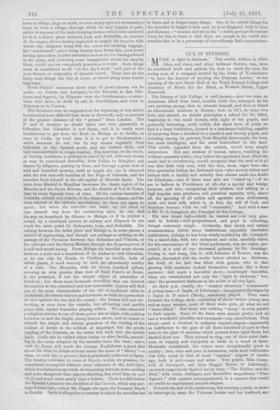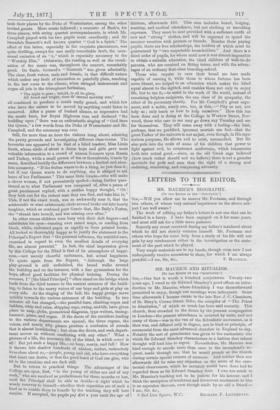, LUX IN TENEBRIS,
" US1C is light in darkness." This motto, written in white Ill lilies, red roses, and other brilliant flowers, was, from its combined truth and pathos, the first to catch the eyes, the seeing eyes, of a company invited by the Duke of Westminster "to have the honour of meeting the Princess Louise," on her opening of the new Music Hall of the Royal Normal College and Academy of Music for the Blind, at Westow Street, Upper Norwood.
The history of this College is well known,—how one man, an American, blind from birth, humble birth too, managed, by his own untiring energy, first to educate himself, and then to found an educational institute in Boston ; how, in 1871, he came over here, and started, on similar principles, a school for the blind, beginning in two small houses, with eight or ten pupils, and gradually increasing, until, within this short term of years, we find it a large institution, located in a handsome building, capable of receiving from a hundred to a hundred and twenty pupils, and counting among its patrons, from Royalty downwards, the best, the most intelligent, and the most benevolent in the land This result, regarded from the outside, would seem simply miraculous. But any student of human nature, watching the brilliant assembly which, long before the appointed hour, filled the music hall to overflowing, would recognise that the soul of it all was that little wiry man, with the thin, keen, eager face—the blue spectacles hiding the darkened eyes—who moved hither and thither with a facility and activity that almost made one doubt his blindness,—one of those men who are "raised up "—if we. are to believe in Providence at all—for a special and benign purpose, and who, recognising their mission, and adding to a high impulse wise prudence and practical capacity, with, above all, the ignoring of all selfish and egotistic aims, deliberately work out their will, which is, in fact, the will of God, and therefore become what we call "successful." And such a man is Mr. F. J. Campbell, the Principal of this College.
His new musio hall—which he cannot see l—is very plea- sant to behold—well-proportioned, and good in colouring, though extremely simple. Evidently, that lavish and useless ornamentation which some institutions, especially charitable institutions, indulge in has been wisely avoided by Mr. Campbell. On a raised dais, with two entrances and exits, carefully railed, for the convenience of the blind performers, was the organ, pre- sented, at a cost of one thousand guineas, by Dr. Armitage. Facing it, and hung, like it, with festoons of flowers, was the gallery, decorated with the motto before alluded to. Between, the body of the hall was filled with guests, who in that glowing July sunshine looked themselves almost like a floral parterre ; and made a beautiful show,—touchingly beautiful, when one remembered not only the "light in darkness," but, alas 1 the permanent darkness in the midst of all this light.
At three p.m. exactly, the "musical afternoon" commenced A. young man—J. Inglis, of Edinburgh—inaugurated the organ by a fugue in D minor (Bach), admirably played. Then came forward the College choir, consisting of about twelve young men and as many women, some of them mere girls, all what we call "stone-blind." But there was nothing " stony " or even painful in their aspect. Some of the faces were almost pretty, and all had a wonderful placidity and sweetness—nay, cheerfulness. They stood—such a contrast to ordinary concert-singers—apparently as indifferent to the gaze of all these hundreds of eyes as they were to the glare of sunshine which poured down upon them, but dazzled them not. They seemed to sing, out of their quiet dark- ness, as happily and enjoyably as birds in a wood at dawn. Musically considered, the voices were exceptionally good in quality ; true, clear and pure in intonation, while their cultivation was fully equal to that of most " sighted " singers of similar age, both in part-songs and solos. Two pupils, Miss Camp- bell, of Liverpool, and Miss Maggio Reece, of Edinburgh, executed respectively Spohr's lovely song, "The Maiden and the Bird," with violin obbligato, and Stradella's magnificent "Pieta Signore !" with quartet accompaniment, in a manner that would do credit to experienced concert-singers.
Towards the end of the latter song, but entering quietly, so as not to interrupt it, came the Princess Louise and her husband, and took their places by the Duke of Westminster, among the other invited guests. More music followed ; a concerto of Bach's, for three pianos, with string quartet accompaniments, in which Mr. Campbell played with his two pupils most excellently ; and Sir Sterndale I3ennett's well known quartet "God is a Spirit." The effect of this latter, especially in the exquisite pianissimos, was quite thrilling, except for one easily-remediable fault, the occa- sional omission of an " which is especially necessary to the " Worship Him." Otherwise, the reading as well as the vocali- sation of the music was, throughout the concert, remarkably good. Its finale, Gounod's " Nazareth " was given admirably. The clear, fresh voices, male and female, in that difficult unison which makes any fault of intonation so painfully plain, reaching in the last verse to the climax, when stringed instruments and organ all join in the triumphant fortissimo, " The night is gone ; behold, in all its glory, All broad and bright, rises di' eternal morning star," all combined to produce a result really grand, and which few who have the nature to be moved by anything could listen to unmoved. After a pause of hushed silence, so impressive had the music been, her Royal Highness rose and declared "the building open ;" there was an enthusiastic singing of "God Save the Queen," a few words from the Duke of Westminster and Mr. Campbell, and the ceremony was over.
Still, for more than an hour the visitors hung about, admiring the pretty grounds and investigating different class-rooms. The favourite one appeared to be that of a blind teacher, Miss Lizzie Scott, whose circle of about a dozen boys and girls gave most valuable information to a crowd of unseen listeners upon Russia and Turkey, 'while a small person of ten or thereabouts, Gracie by name, deecribed lucidly the difference between a limited and abso- lute monarchy. "If the Sultan wants to do a thing, he just does it ; but if our Queen wants to do anything, she is obliged to ask leave of her Parliament." This same little Gracie—who will make a clever woman, if not prematurely spoiled—being further ques- tioned as to what Parliament was composed ofoifter a pause of great puzzlement replied, with a sudden happy thought, "Oh they look out for the richest man they can find, and take him in." This, if not the exact truth, was so awkwardly near it, that the aristocratic or semi-aristocratic circle around broke out into hearty laughter, which so confused poor Gracie that, like Baily'a Festus, she "shrank into herself, and was missing ever after."
In other rooms children were busy with their deft fingers—sad
substitutes for eyes—running over raised maps, or reading from blank, white, embossed pages as rapidly as from prieted books. All looked so thoroughly happy as to justify the statement in the Principal's Report that "the personal influence, the watchful care, exercised in regard to even the smallest details of everyday life, are almost parental." in fact, the chief impression given by this College for the Blind is that of its atmosphere of happi- ness,—not merely cheerful endurance, but actual happiness. 'to quote again from the Report, "Although the large play-ground is still unfinished, the broad walks around the building and on the terraces, with a fine gymnasium for the boys, afford good facilities for physical training. During the recesses, I" [the blind Principal] "often stand on the bridge which leads from the third terrace to the central entrance of the build- ing, to listen to the merry voices of our boys and girls at play on every side. At the ringing of the bell, the happy groups move quickly towards the various entrances of the building. In two minutes all bee changed,—the parallel-bars, climbing-ropes and ladders, whip and reins, skipping-rope, swing, and tilt, have given place to map, globe, geometrical diagrams, type-writers, tuning- hammer, piano, and organ. If the doors of the corridors leading tothe various departments are opened, the three organs, the voice!, and nearly fifty pianos produce a confusion of sounds that is almost bewildering ; but close the doors, and each.depart- ment moves on without conflicting with any other." What a picture of a life, the necessary life of the blind, in which sound is all! But yet such a happy life,—so busy, merry, and full I How it throws into shadow hundreds of aimless, useless, melancholy lives close about 119,—people, young and old, who have everything that heart can desire, or that the good hand of God can give, who sit in the sunshine and are dark still.
But to return to practical things. The advantages of the
College are open, first, "to the young of either sex and of any rank," who are received as probationers for three months or less, until the Principal shall be able to decide—a right which be wisely reserves to himself—whether their capacities are of such a kind as to enable them to benefit by the teaching they will here receive. If accepted, the pupils pay £50 a year until the age of
thirteen, afterwards £60. This sum includes board, lodging, washing, and medical attendance, but not clothing or travelling expenses. They must be sent provided with a sufficient outfit of new and " strong " clothes, and will be expected to spend the summer vacation with parents or friends. Besides these paying pupils, there are free scholarships, the holders of which must be guaranteed by "two respectable householders." And there is a third order of pupils, for whom until now it was almost impossible to obtain a suitable education, the blind children of well-to-do parents, who are received on fitting terms, and with the advan- tages of an ordinary first-class boarding-school.
Those who require to earn their bread are here made capable of earning it, while those to whom fortune has been more liberal, are helped to an education which makes the blind equal almost to the sighted, and enables them not only to enjoy life, but to use it,—to assist in the work of the world, instead of remaining helpless recipients, the one class of its sympathy, the other of its pecuniary charity. For Mr. Campbell's great argu- ment, and a noble, manly one, too, is this,—" Pity us not, nor help us ; only teach us how to help ourselves." How this has been done and is doing at the College in Westow Street, Nor- wood, those who care to see may go down any Tuesday and see for themselves. They will come away with a feeling—the best, perhaps, that we purblind, ignorant mortals can feel—that the great Father of the universe is not unjust, even though, in His mys- terious purposes, He allows evil to exist, unremedied. But He also puts into the souls of some of his children that power to fight against evil, to counteract misfortune, which transmutes both into actual good,—since, as the old Greek sage believed (how much rather should not we believe) there is not a grander spectacle for gods and men than the sight of a strong soul enduring, combating, and conquering adversity.































 Previous page
Previous page